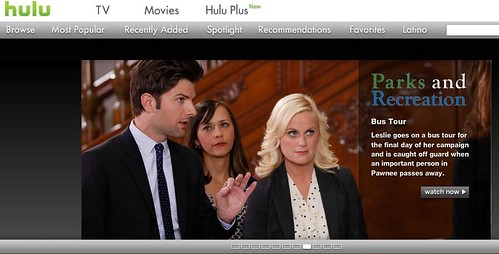Netflix cofounder Reed Hastings is known for making the biggest business blunder of 2011. In July, he announced that subscribers to both the Netflix streaming and DVD service now had to pay for each separately, a sudden 60% increase that took the Netflix subscription from an $8 a month charge you barely noticed on your statement to a $16 a month charge you definitely noticed. To make matters worse, in September, Netflix spun off its popular DVD-by-mail service into a new entity called Qwikster.
Those image problems still exist. What makes an idiot look smarter? A dumber idiot emerging.
Enter Hulu.

Last week, Hulu out-dumbed Netflix. As Michael Grotticelli (Broadcast Engineering) explains, "Hulu, the [New York Post] report said, attracted 31 million unique users in March under a free-for-all model. But the newspaper quoted sources saying the move by Hulu toward the new business model -- called 'authentication' because viewers would have to log in with their cable or satellite TV account number -- was behind the move last week by Providence Equity Partners to sell out its share of Hulu after five years." Stan covered the news in real time (see "Hulu or not Hulu?" and "Tell Hulu NO!").
Hulu proved itself to be the supreme idiot by refusing to issue any statement silencing or clarifying the rumors. When a corporation refuses to answer a rumor -- one that is harming its image -- that's generally a sure sign that the rumor is true.
Last week, Hulu made half-a-billion dollars in ad revenues. It did that by showing commericals. It did that by showing commercials to people who viewed their product.
Hulu makes how much if they switch over to this verification model?
Not as much. That's for sure.
But when in American history has Big Business ever shown great sense without public pressure?
The Free Press has made voicing your opinion very easy:
This is how we watch TV in the 21st century: We fire up our laptops, our Roku boxes or our mobile devices. We open Hulu. We search for Parks and Recreation. Done.
But Hulu’s owners — Disney, News Corp. and Comcast, which respectively own ABC, Fox and NBC — are trying to ruin this experience.1 If they have their way, you’ll need a cable subscription to watch any TV show on the Internet.
Back in the days before cable, people paid nothing to access network TV over the air. But cable programmers introduced a new model: You pay a lot of money to subscribe to a bundle of channels and then you get all the TV shows you want — and many more that you don’t want.
It turns out people don’t want to pay exorbitant fees for hundreds of channels they’ll never watch (Bruce Springsteen wrote “57 Channels and Nothin’ On” even before the advent of DogTV).
Enter Hulu. The Internet TV site makes it easy for you to watch the shows you want to watch, when you want to watch them, for free. If you want to view them on your mobile device or with an Internet-connected TV, you pay a small monthly fee. That fee, along with traditional commercials, generates revenue.
Hulu now boasts 31 million subscribers who like it that way. It’s how many of us watch TV, and an innovative model for the future of online entertainment.
But Hulu’s owners, including Brian Roberts, Bob Iger and Rupert Murdoch, are chucking all of that out the window.
These gatekeepers at Comcast, Disney and News Corp are moving to an “authentication” system that would allow only cable TV subscribers to access Hulu.
These guys are trying to put the Internet genie back in the bottle while destroying the concept of free television that dates back to the earliest days of the medium. It’s up to us to tell them to stop.
Thanks,
Josh, Tim, Candace and the rest of the Free Press team
1. "TV in Real Dime," the New York Post, April 30, 2012: http://act2.freepress.net/go/10025?akid=3486.8742993.IzEIM6&t=6
P.S. Like our work? The Free Press Action Fund is powered by donations from people like you. We don’t take a single cent from business, government or political parties. Please keep us going strong with a gift of $10 — or more — today. Thank you!
x
